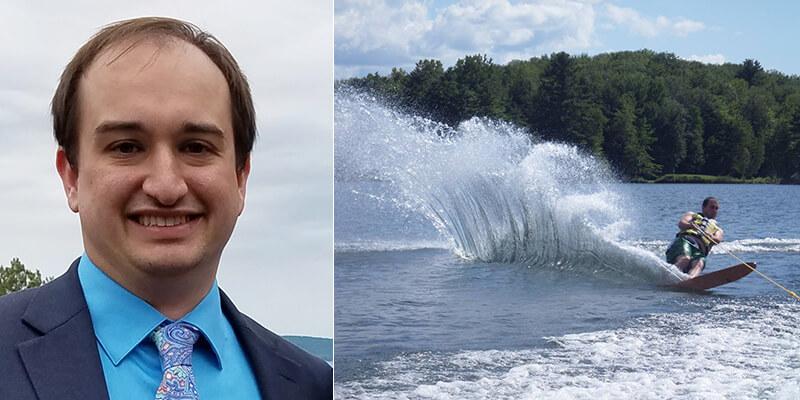Our featured alumnus in this issue of IMPACT is Andrew Giroux, a recent graduate of UVM’s Electrical Engineering Master’s Program.
IMPACT: Andrew, you are a fairly recent graduate of the UVM Graduate College, but obviously you were an undergrad somewhere first. Where did you do your undergraduate work and what were some of the highlights?
ANDREW: I did my undergraduate degree in Electrical Engineering at UVM and spent the vast majority of my spare time there building electric racecars as part of the Alternative Energy Racing Organization (AERO). The team was, and still is, a great group of roughly 10-15 students who put dozens of hours each week into building a racecar to compete internationally. Historically, the team has done incredibly well, broken some competition records, and had many graduating team members land incredible jobs because of the skills they learned on the team.
IMPACT: I’ve seen the AERO cars many times, and they sure look like fun to drive. Tell us about your graduate program at UVM and some of the faculty who were influential to you.
ANDREW: I was fortunate enough to be able to take part in UVM's Accelerated Master's Program with Dr. Jeff Frolik as my advisor. The program moves some of the graduate-level classes into the last semester of senior year and enables one to finish their Master's degree in only one additional, albeit jam-packed, year.
Dr. Frolik was both my undergraduate advisor and the advisor for AERO, so it was wonderful to continue working with him through my Master's. I was very interested in the consumer-facing smart electronics that we interact with every day, and so I focused my coursework on both Dr. Frolik's communications classes and Dr. Tian Xia's embedded electronics classes.
IMPACT: I’m pleased to say that I helped Dr. Folik start the AERO program some years ago. What was the focus of your Master's thesis?
ANDREW: I tailored my Master's courses and thesis to cover wireless communications and associated elements. My thesis focused on how best to estimate where to place a wireless repeater while exploring an unknown environment so that communication can be maintained from the start of an exploration to the leading edge. While funded by NASA, it also had implications for other applications, such as in maintaining communications for emergency responders as they enter into an emergency scene.
IMPACT: We’ll find out in a minute why you were interested in supporting first responders. After graduation, what were your next steps?
ANDREW: While discussing existing job offers and my plans for post-graduation with Dr. Frolik, he asked me if I'd like to work at his soon-to-be-founded energy startup, Packetized Energy. The company is focused on making the electricity grid work better to support renewable energy, and it does so by coordinating smart devices in a really unique way.
The opportunity to have such a large influence on a company's trajectory and to be able to build some really cool technology to solve global energy problems was incredibly alluring, and so I became the first employee at Packetized Energy the day after I defended my thesis. Since then, the company has grown significantly and we are now shipping our UL-certified smart water heater thermostat all over the country with a few new products being released very soon.
IMPACT: That is excellent, and we all have high hopes for Packetized Energy. You have also been a big supporter of Generator, Burlington's not-for-profit maker space. Why is Generator important to you -- and the community?
ANDREW: Generator is foundational to Burlington's entrepreneurial activity. It significantly levels the playing field for those who wish to start a tech business but don't have the necessary upfront capital needed to invest in modern tools and equipment.
For a great monthly rate, anyone can get access to laser cutters, 3D printers, a CNC plasma cutter, full metal and wood shops, and more. I have a membership at Generator because it is, by far, the most cost-effective way to access advanced manufacturing equipment while also having a bunch of really smart, passionate people to bounce ideas off of.
And here's a little-known secret that only a few local companies have figured out: there are many talented Generator members who might have the perfect skillset you've been looking for in a new employee.
IMPACT: What would you tell someone interested in studying at the College of Engineering and Mathematical Sciences (CEMS) – engineering, in particular? Why should they come here?
ANDREW: I may be a bit biased, but I feel engineering is one of the most interesting careers available. CEMS is growing at an impressive rate. And with updated facilities, a large variety of technology research areas, racecars, and a serious push to take great ideas out of the lab and support them becoming successful startups, why wouldn't someone come here?
IMPACT: Excellent point. Tell our readers about any interests you have outside your career...
ANDREW: I like to spend time outside doing a variety of activities, but I've been a volunteer fire fighter and EMT for nearly a decade now and it's the most rewarding pastime I've found. It's filled with amazing people doing amazing things for their communities. I'm honored to be able to be a part of it. If you're looking for a new hobby, I would highly recommend it. It will change your life.
IMPACT: Andrew, thanks for your time and best of luck with one of UVM’s most exciting new spin-off companies, Packetized Energy.
